
UK dog laws: What you need to know

Allie Simpson
18 November 2021 | 7 minutes read
Thinking of welcoming a dog into the family? Don’t get us wrong, it’s exciting to visit your local pet shop and buy all the toys and cute bedding, or research fun tricks to teach your new pooch. But being a responsible owner is more than simply taking care of your dog’s wellbeing and training.
In the UK, there’s a lot of legal requirements that come with a dog. We take a look at some of the laws you should be aware of as a new (or existing!) dog pawrent.
Table of Contents
- What’s the law around having your dog in the car?
- What’s the dog microchip law?
- What’s the dog tag law?
- What’s the dog fouling law?
- What’s the dog breeding law?
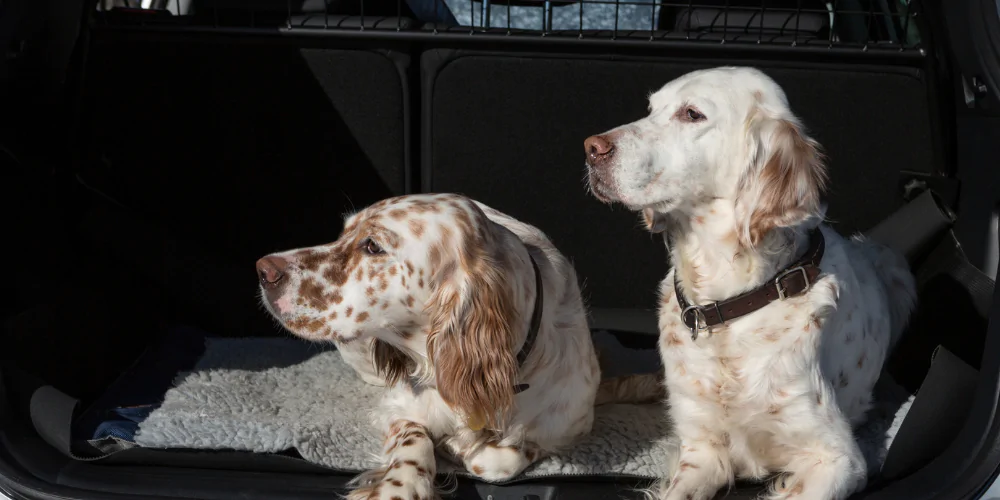
What’s the law around having your dog in the car?
When travelling with your dog in the car, there are laws in place to ensure the safety of everyone on the journey.
Before you head out on the open road for some exciting adventures with your canine, you need to think about safety. When it comes to travelling in the car with your dog, always keep in mind Rule 57 of the Highway Code.
Rule 57 of the Highway Code states: ‘when in a vehicle make sure dogs or other animals are suitably restrained so they cannot distract you while you are driving or injure you, or themselves if you stop quickly. A seat belt harness, pet carrier, dog cage or dog guard are ways of restraining animals in cars.’
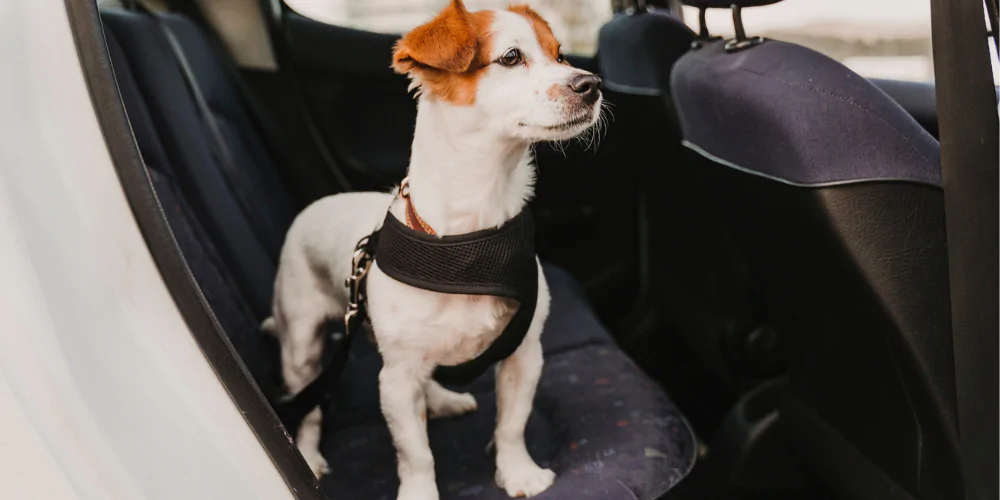
> Wearing a seatbelt
Securing your dog with a dedicated harness or seat belt helps to prevent dogs from being a distraction to drivers. If there was an accident, they’d be secure enough to prevent or limit injuries.
Ignoring the rule could not only put any humans and dogs within the car in danger, but also land the driver with a £5,000 on-the-spot fine. Youch! We’re sure your dog would rather that money be spent on treats!
Most pet stores can give you guidance on ways you could transport your dog safely, as this can vary depending on their size. A smaller dog may be suited to a crate or carrier, and a larger dog may be better restrained from moving into the front of the car if you use a dog guard.
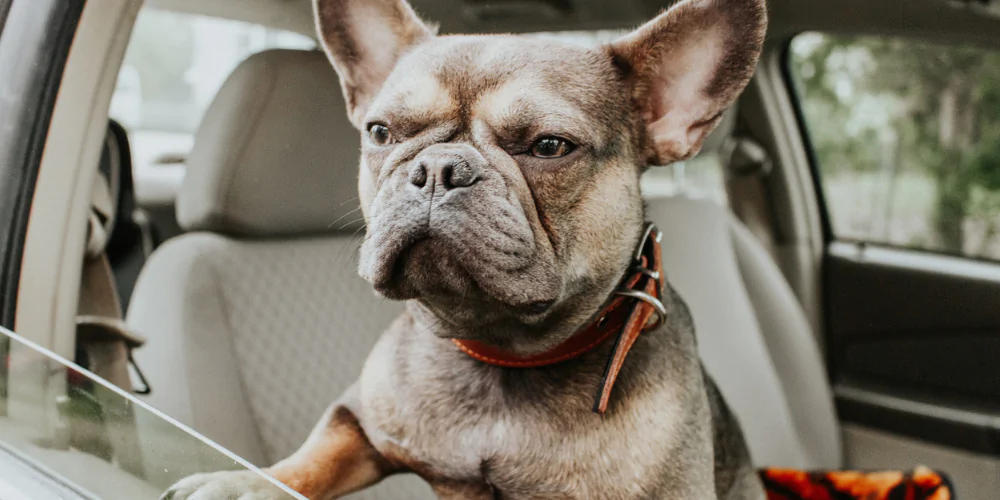
> Leaving a dog in the car
You may be surprised to learn that leaving your dog unattended in the car isn’t actually illegal – but animal cruelty is. If the car doesn’t have suitable conditions and a dog is harmed or in distress, it’s considered animal cruelty.
Animal cruelty is illegal under the Animal Welfare Act 2006. Breaking animal cruelty laws carries a punishment of up to six months in prison and an unlimited fine.
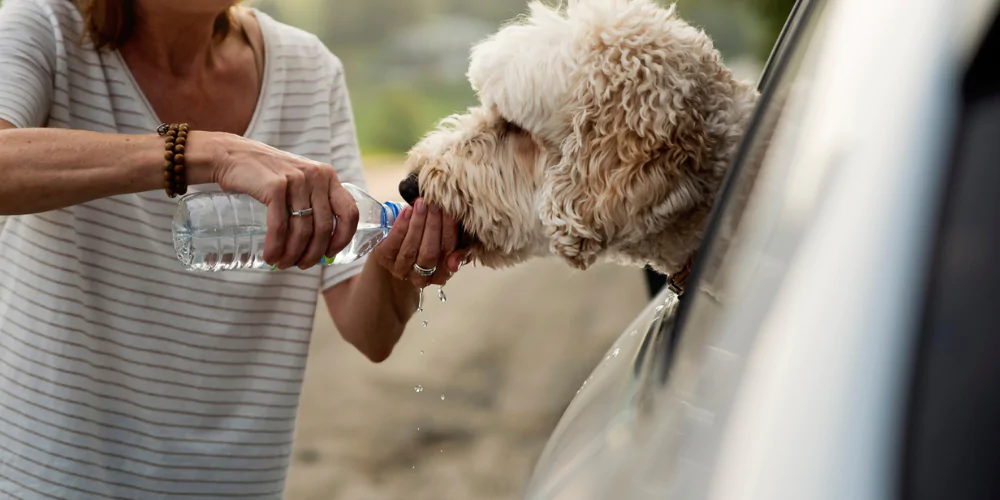
> Keeping a dog safe in the car
If your dog goes with you on longer car trips, make sure you take hourly stops to let them stretch, go to the toilet, and get some fresh air.
If you absolutely have to leave them in the car for a short period of time, make sure it’s not too hot or too cold and there’s plenty of fresh air. Check that they have access to food and water, though watch how much food you give as some dogs get car sick.
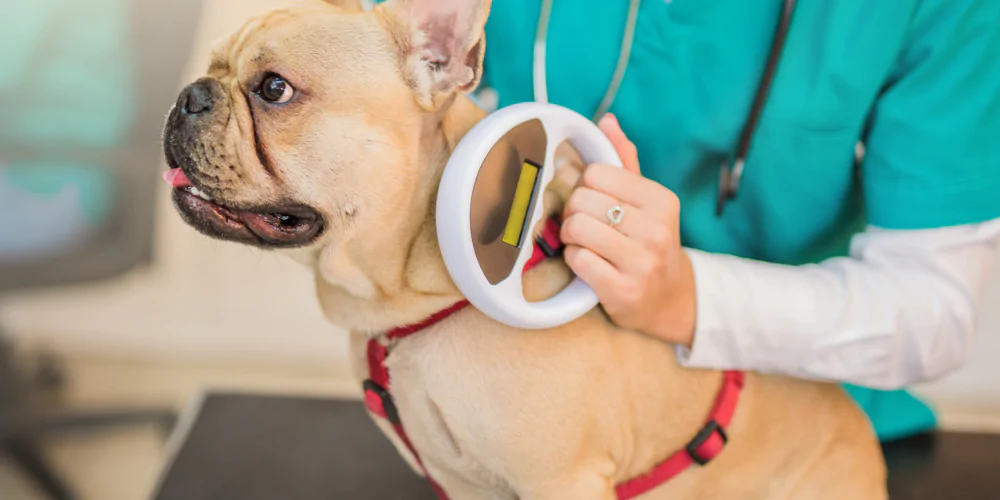
What’s the dog microchip law?
It’s a legal requirement for dogs to have an up to date microchip. This requirement has been compulsory since 2016, and not getting your dog microchipped carries a £500 fine
The cost to have your dog microchipped varies around the country, but the average fee is around £15. That’s quite a difference compared to £500, we hope you’ll agree!
The law was put in place as it could:
- Improve dog welfare.
- Help reunite lost dogs with their worried owners.
- Help to prevent theft as your dog is traceable.
- Increase accountability for owners whose pets have attacked other people and dogs.
It’s important to make sure your microchip details are kept up to date if your contact details change or you’re a new owner – else you can’t be contacted if your pet is found! It may also be a condition of your pet insurance policy that your dog is microchipped before they can give you cover.
Adopted a dog and not sure if it’s microchipped? Your local vet can check this for you.
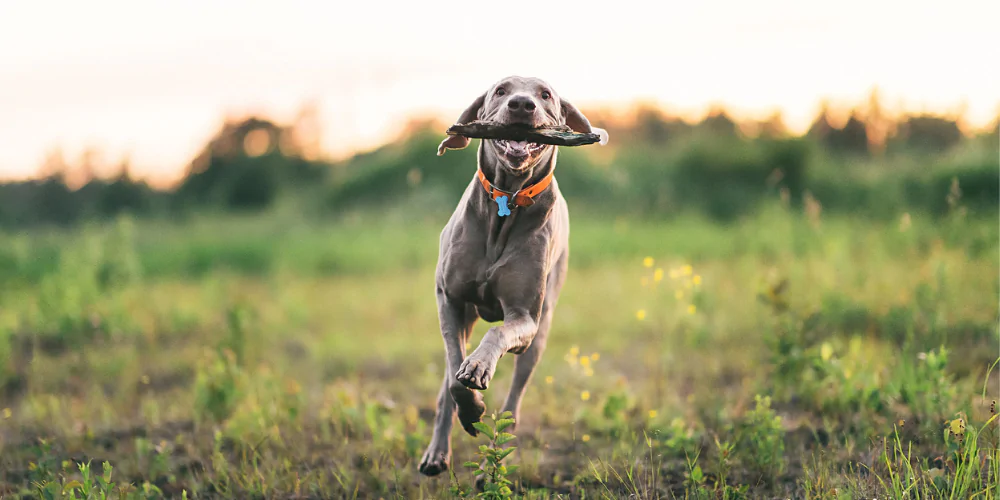
What’s the dog tag law?
Next up, we’re going over the dog tag law.
Your dog may not wear a collar around the house (and that’s fine), but it’s a dif-fur-ent story when it comes to leaving the house. Legally, any non-working canine needs to wear a dog ID collar on walkies, even if they’re using a harness.
An ID tag allows pets to be quickly identified and reunited with their owners if they were to get separated on a walk or escape the house. The tag must have the owner’s name and address, while putting your pooch’s name on there is optional.
Just a heads up, this law doesn’t apply to Guide Dogs and Police Dogs. Not following this dog tag law could result in a fine of up to £2,000, a large price to pay for walkies.
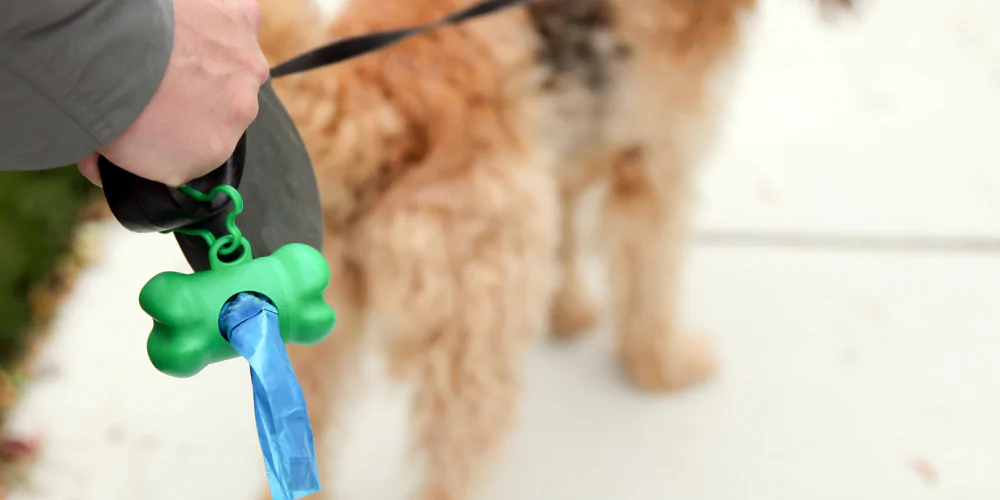
What’s the dog fouling law?
Ready to learn about the law around dog fouling? Yep, picking up your dog’s poo is more im-paw-tant than you might think.
Nothing ruins a walk more than standing in your dog’s mess, or having to stop your own pet from trying to eat it (hey, we’ve all been there). While many see it as a frustrating inconvenience, it could be quite dangerous to your health. Contact with dog faeces may cause toxocariasis, an infection that could lead to nausea and even blindness.
If caught leaving a mess behind, the legal responsibility falls on the person walking the dog at the time. The punishment is an £80 on the spot fine, which increases to £1,000 if left unpaid.
Claiming to be unaware of the mess or not having a bag will not stop dog walkers from being held responsible. Some local authorities may hand out fines to dog walkers who are found to not have a poo bag or scoop to take care of business.

What’s the dog breeding law?
Some dog breeds can be very expensive – we’re talking thousands of pounds for a new puppy in some cases. Unfortunately, a small number of unscrupulous people may try and gain an unreasonable profit from immorally selling dogs. They have no thought of the health and welfare of either mum or her pups.
To better protect animals against being used purely as breeding machines, there are several laws in place to help control and regulate puppy breeding.

> Dog breeding licence
People who breed three or more litters of dogs a year must (by law) have a licence to do so. Some of the conditions of the licence include:
- Keeping the dogs in a suitable condition
- Giving them regular exercise
- Ensuring they have adequate bedding, food, and drink
- Protecting them from disease, suffering, pain, and injury
Breeding dogs without a license can result in a prison sentence of up to five years and unlimited fines under Lucy’s Law.
> What is Lucy’s Law?
Lucy’s Law was introduced in April 2020 to prevent unlicensed breeders and third parties (such as pet shops) from selling dogs.
The name comes from Lucy, a Cavalier King Charles Spaniel who had been kept in a puppy farm cage for breeding purposes for years. She had been mistreated and left with fused hips, a curved spine, and epilepsy. When she was rescued, her new human, Lisa Garner, fought to stop this from happening again.
Thanks to Lucy’s Law, the only way to legally get a pet dog now is:
- Directly from a licenced breeder who is listed with an official kennel registry, such as the Kennel Club. They should be able to show puppies interacting with their mother in a safe setting.
- By rescuing a pooch from a registered charity or adoption shelter.
The law was a huge milestone in making sure pets are bred responsibly and safely, protecting thousands of animals from cruelty.
There’s many ways to be a responsible dog owner. Don’t forget to consider lifetime dog insurance for your confident canine in case of unexpected vet fees.


